Posts Tagged ‘Peace’
Friday, March 1st, 2019
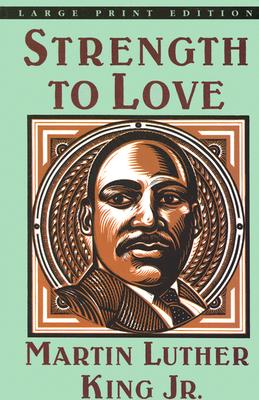 Martin Luther King Jr.’s, Strength To Love, was written during the Civil Rights struggle in the early 1960s. King’s stirring style was aimed at a live church audience and you can almost hear the “Amens” after some sentences. Many of his political statements were censored by the publisher at the time, but almost 60 years later his words remain powerful and relevant. King encourages people to be forgiving, non-violent, non-conformists; and to confront militarism and inequality in society.
Martin Luther King Jr.’s, Strength To Love, was written during the Civil Rights struggle in the early 1960s. King’s stirring style was aimed at a live church audience and you can almost hear the “Amens” after some sentences. Many of his political statements were censored by the publisher at the time, but almost 60 years later his words remain powerful and relevant. King encourages people to be forgiving, non-violent, non-conformists; and to confront militarism and inequality in society.
Our scientific power has outrun our spiritual power. We have learned to fly the air like birds and swim the sea like fish, but we have not learned the simple art of living together.
Expenditures for defence have risen to mountainous proportions. The nations have believed that greater armaments will cast out fear, but they have produced greater fear.
Through non-violent resistance we shall be able to oppose the unjust system and at the same time love the perpetrators of the system. Hate cannot drive out hate, only love can do that.
Capitalism must undergo continual change if our great national wealth is to be more equitably distributed.
All life is interrelated. I can never be what I ought to be until you are what you ought to be.
Tags: martin luther king, Peace, people power, political change, reviews
Posted in Book Reviews, Peace | 1 Comment »
Saturday, February 2nd, 2019
Ferdinand (1936) by Munro Leaf is one of the most influential children’s books because of its simple but powerful theme. The tale of a bull who likes to smell flowers instead of fighting was seen as a pacifist text at the time of the Spanish Civil War.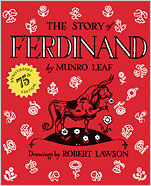 Ferdinand chooses to be himself rather than follow the aggressive crowd. No wonder the book was:
Ferdinand chooses to be himself rather than follow the aggressive crowd. No wonder the book was:
Read the true story of the bull who inspired it: The Marginalian.
Munro Leaf also wrote books which reflected the stricter child-raising style of his time. 3 and 30 Watchbirds (1941) condemns children’s behaviours such as shoe-scuffing, mumbling, moaning, fidgeting, and wasting food. Some of it’s in the spirit of war-time frugality, but some is just plain excessive:
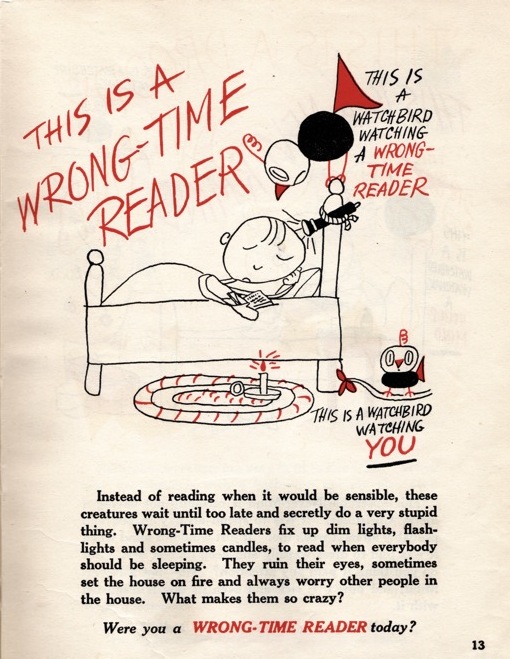
Grammar Can Be Fun is slightly more tongue-in-cheek and warns children against slack language such as “gimme, wanna, gonna, and ain’t”.
Tags: children's books, classics, Peace, picture books
Posted in Book Reviews, Children's Books, Peace | No Comments »
Sunday, August 14th, 2016
There are many potent alternatives to military intervention which are often not pursued. The peace scholar, Gene Sharp, listed 198 non-violent alternatives including noncooperation, protest, sanctions, persuasion, and nonviolent intervention. The world spends about $1.6 trillion a year on the machineries of war – imagine if this was invested in fighting poverty, in education and health care. Research shows that non-violent campaigns during the last century were more successful than wars in bringing change. When unarmed civilians gather in their thousands on the streets, people power has an impact.
It is the great challenge of our time: how to achieve justice — with struggle, but without war.– Howard Zinn
Video: Jamila Raqib promotes nonviolent resistance to people living under tyranny — and there’s a lot more to it than street protests:
Tags: Peace, people power, political change
Posted in Peace | No Comments »
Saturday, August 29th, 2015
Never before have so many people fled political persecution and war as today.– German 10-point plan
The biggest refugee crisis is history is unfolding and our government refuses to increase our (already low) quota of refugees. Our population has almost doubled since 1987, yet our quota has fallen. Globally, 59.5 million people are forcibly displaced (up from 33 million in 2010). The crisis in Europe mirrors the period before WW2 when the flood of Jewish refugees were blocked by unyileding refugee quota systems in the US, UK, France, Canada, South Africa, Australia and NZ.
In the late 1930s Jewish refugees from Hitler’s Germany were particularly keen to migrate to New Zealand. However, New Zealand restricted their entry. –Te Ara Encyclopedia of NZ
Currently the largest refugee-hosting countries are Turkey, Pakistan, and Lebanon. The crisis is massive but that’s no excuse for NZ not to make a start by increasing our refugee quota.
Tags: Peace, political change
Posted in Peace | No Comments »
Friday, July 24th, 2015
Two war memoirs I was gripped by recently. Resistance by Agnes Humbert tells of her four year imprisonment by the Nazis. The title refers not only to the French Resistance but also the inner strength that enabled Humbert to survive horrific treatment. It’s a riveting read which shows ‘how the human mind can preserve the heart and soul intact against all attempts to annihilate it’ (Linda Grant).
A Moment of War by Laurie Lee relates his time in the Spanish Civil War. Lee begins his journey as an idealistic young man and ends it a shattering ‘moment’ when he sees the true consequences of war. An honest, eloquent book; the third in Lee’s stunning memoir-trilogy (with Cider With Rosie and As I Walked Out One Midsummer Morning).
‘I was in that flush of youth that never doubts self-survival, that idiot belief in luck and a uniquely charmed life, without which illusion few wars would be possible’ – Laurie Lee
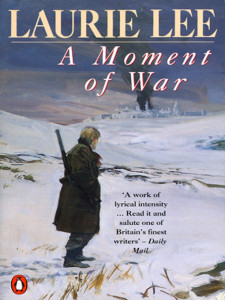
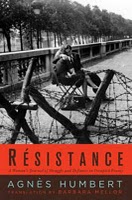
Tags: books, Peace
Posted in Peace | No Comments »
Friday, July 10th, 2015
Thirty years ago today, French spies attacked the Rainbow Warrior in Auckland harbour. It was on a voyage around the Pacific, relocating islanders from radioactive areas and protesting against American and French nuclear weapons. One of the ship’s engineers, 25 year old Hanne Sorensen, describes what happened that night:
“I had been working on another protest boat during the day doing some gas welding. That night I decided to go for a walk – I just had this urge to get off the Warrior…I can’t explain it. I came back at midnight and was stopped by police on the wharf who said there’d been some explosions. I thought, ‘Had I forgotten to turn the gas off?’ I didn’t even realise the Warrior had sunk at first. The crew were all huddled in blankets on the wharf and I still didn’t realise what had happened even though they all told me. It wasn’t until morning when I saw the boat that it really hit me hard.The first bomb blew a huge hole in the engine room – you could drive a car through – and the crew scrambled ashore as the boat sank. The next bomb exploded on the propeller shaft, close to my cabin. It was then we realised that the ship’s photographer, Fernando Pereira, was missing. He had returned to his cabin to get his camera and was drowned.
These people were my friends, like family…we’d all been through some intense things and trusted each other with our lives. Now they’d sunk our ship and killed one of our friends. After the bombing, the Greenpeace office was flooded with clothes, sleeping bags, and offers of homes to stay in. You couldn’t have had a stronger expression from the people of the world. Our aim back then was to save the world – not thinking that fifteen people on a boat could save the world, but that this was our little piece in a big puzzle. It matters what every single one of us does.” (Extract from my book, Peace Warriors).
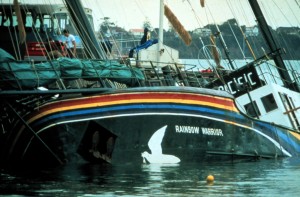 Photo by permission of Greenpeace, NZ
Photo by permission of Greenpeace, NZ
Tags: non-violence, Peace, people power, political change
Posted in Peace | No Comments »
Sunday, October 26th, 2014
Thousands of unarmed students in Hong Kong are currently standing up for democracy by taking to the streets. It’s often students who lead the way in peaceful protest movements:
- 1943: The White Rose group were university students in Munich who distibuted thousands of leaflets exposing the Nazis’ crimes and encouraging people to resist. They were executed.
- 1957: The Little Rock Nine were high school students in America who broke through the race barrier by enrolling in the local all-white high school despite threatening mobs.
- 1986-89: University students in China protested to demand more freedom, culminating in Tiananmen Square with half a million Chinese citizens. The government crushed the event.
- 1988: University students in Burma led massive street marches against the military rulers. The army killed hundreds but Burma eventually got free elections.
- 2000: Students in Serbia led a non-violent protest to help oust a corrupt government.
Tags: non-violence, Peace, people power, political change
Posted in Peace | No Comments »
Monday, February 10th, 2014
Alice Walker’s picture book Why War Is Never a Good Idea begins with the bright, comforting colours of a book for young children, but as War devastates the land the images become grim. It’s a scary message and parents will have to judge if it suits their children. The illustrations by Stefano Vitale are evocative and Walker’s words are true:
Though War is old
It has not become wise.
Though War has a mind of its own
War never knows who it is going to hit.

Walker comments: ‘War attacks not just people, “the other,” or “enemy,” it attacks Life itself … It doesn’t matter what the politics are, because though politics might divide us, the air and the water do not … Our only hope of maintaining a livable planet lies in teaching our children to honor nonviolence, especially when it comes to caring for Nature, which keeps us going with such grace and faithfulness.’
Tags: children's books, non-violence, Peace
Posted in Book Reviews, Children's Books, Peace | No Comments »
Tuesday, August 6th, 2013
August 6, 1945, an atom bomb destroyed Hiroshima – 80,000 people died instantly, tens of thousands more in later years. A larger bomb was then dropped on Nagasaki, killing another 40,000 people. Photos: Nagasaki before and after the bomb:
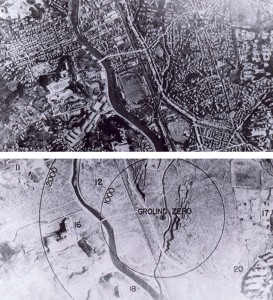
The US Secretary of War, was concerned that America’s reputation for fair play might be damaged by targeting urban areas. General George Marshall had a similar view, believing the bomb should be used first on military targets … Both men’s views were ignored.– Target Nagasaki by Craig Collie
Some say the bombs were the only way to end the war. I say the targeting of civilians with nuclear weapons is immoral, illegal, and horrific (A.C. Grayling argues this in Among the Dead Cities).
Pablo Neruda’s Ode to the Atom speaks of how the atom was ‘unchained’ on August 6:
Mad spark, go back to your shroud,
bury yourself in your mineral mantle,
be blind stone once again, ignore the outlaws,
and collaborate with life, with growing things…
Tags: Peace
Posted in Peace | No Comments »
Saturday, July 6th, 2013
The Danes challenged the most barbaric regime of the modern period and did so not with troops or tanks but with singing, striking, going home to garden, and standing in public squares. – Peter Ackerman
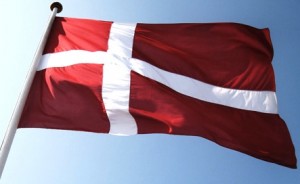 Denmark’s resistance of the Nazis is one of the finest examples of people power. The Germans occupied Denmark during WW2 and took over industry and agriculture to support Hitler’s war machine. But the Danish government found ways to sabotage the Germans without waging war. In 1943 and 1944 they organised nationwide strikes. The Nazis threatened them with tanks and guns, cut off water and power, but the strikers held on and the army backed off. They succeeded in frustrating the supply of war materials to Germany.
Denmark’s resistance of the Nazis is one of the finest examples of people power. The Germans occupied Denmark during WW2 and took over industry and agriculture to support Hitler’s war machine. But the Danish government found ways to sabotage the Germans without waging war. In 1943 and 1944 they organised nationwide strikes. The Nazis threatened them with tanks and guns, cut off water and power, but the strikers held on and the army backed off. They succeeded in frustrating the supply of war materials to Germany.
Ordinary people also resisted the invaders: by non-cooperation, marches, students refusing to speak German; and communties holding ‘Songfests’ to celebrate Danish culture. When the Germans ordered the arrest of all the Jews in Denmark, people sheltered Jews and smuggled them out to Sweden. They saved almost all the Danish Jews – 8,000 lives.
Tags: non-violence, Peace, people power, political change
Posted in Peace | No Comments »
Wednesday, April 24th, 2013
“You’re far too good a Highlander, Baxter,” he said, “not to be fighting for your king. When you get to France you’ll be throwing Germans over your head on your bayonet.”
“Yes, my ancestors fought for the king… I’m fighting too, only I’m fighting against a war.”
“Oh well,” he said,” they might get you a job rocking cradles.’
“If people of your views run the world,” I answered, “there soon won’t be any cradles to rock.”
– [A prison doctor tries to talk Archibald Baxter into fighting in WW1: quote from We Will Not Cease]
There are two kinds of war hero: those who show bravery while fighting, and those who actively resist violence. Young Archibald Baxter heard a lawyer explain that war was wrong simply because killing was wrong; so when WW1 broke out, Archie refused to enlist and was arrested. He was sent to prison several times and finally, he and other pacifists were loaded onto a ship and taken to Europe. He was imprisoned in England where they put him in chains and fed him on bread and water. To break his stubborn spirit, Archie was sent to the battlefield in France, where army officers tormented him.
Archie was tied to a post outside for up to four hours a day – the ropes so tight his hands turned black. Another time, they dragged Archie out onto the battlefield next to an ammunition dump during a German artillery attack. Incredibly, he was still alive when the explosions and mud settled.
Ordinary soldiers admired his courage, even if they disagreed with him, and were often appalled by their officers’ behaviour. One officer gave Archie a vicious beating then ordered some soldiers to throw him onto a wire covered walkway. But instead of smashing Archie down the soldiers lowered him gently down.
Archibald Baxter has never been hailed as a war hero by the media. His son, James K Baxter, was praised as our finest poet, and today it’s time New Zealand also recognised Archibald’s inspiring life.
Tags: Peace, political change
Posted in Peace | No Comments »
Tuesday, November 6th, 2012
Time is lost when we have not lived a full human life, time unenriched by experience, creative endeavour, enjoyment, and suffering. – Dietrich Bonhoeffer
This sentence, from the book Letters and Papers from Prison, was written by Bonhoeffer three weeks before he was hanged on Hitler’s personal orders in 1945. Hitler had already spelled out his own worldview:
Nature is cruel; therefore we, too, may be cruel.
Bonhoeffer and his brother-in-law lawyer, Hans von Dohnanyi, resisted the Nazi’s control by recording their crimes, helping victims and finally, plotting against Hitler.
Hitler had no greater, more courageous, and more admirable enemies than Hans von Dohnanyi and Dietrich Bonhoeffer.– Elisabeth Sifton and Fritz Stern (read the full story here)

Tags: books, Peace, political change
Posted in Peace | No Comments »
Thursday, March 15th, 2012
Imagine a world where instead of weapons of mass destruction, governments made weapons of mass instruction. Instead of spending $1.5 trillion a year on lethal weapons they could spend it on books. Here’s a better invasion strategy:  Literacy Drones fly over villages and identify those without libraries; vehicles called Book Tanks (photo) move in to give away books to children; finally Seuss Troops visit schools to read aloud to them. Delivering books instead of bullets to children is a more effective way of fighting terror and raising living standards. Artist Raul Lemesoff already has a prototype Book Tank delivering free books all over Argentina, including to rural areas where there are few schools. Read about him in English or visit his Spanish website.
Literacy Drones fly over villages and identify those without libraries; vehicles called Book Tanks (photo) move in to give away books to children; finally Seuss Troops visit schools to read aloud to them. Delivering books instead of bullets to children is a more effective way of fighting terror and raising living standards. Artist Raul Lemesoff already has a prototype Book Tank delivering free books all over Argentina, including to rural areas where there are few schools. Read about him in English or visit his Spanish website.
Tags: books, children's books, non-violence, Peace
Posted in Children's Books, Peace | No Comments »
Saturday, February 18th, 2012
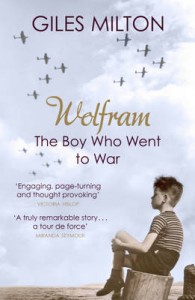 I’ve read many books about Hitler’s Germany but none as remarkable as Wolfram, The Boy Who Went To War, by Giles Milton (Hodder, 2011). It overturns clichés about the War and helps answer the old question ‘Why didn’t more Germans resist Hitler?’
I’ve read many books about Hitler’s Germany but none as remarkable as Wolfram, The Boy Who Went To War, by Giles Milton (Hodder, 2011). It overturns clichés about the War and helps answer the old question ‘Why didn’t more Germans resist Hitler?’
Wolfram was the child of freethinking, artistic parents who resisted by not joining the Nazi Party and refusing to display a swastika flag – their Gestapo file described them as ‘dangerous eccentics’. Wolfram was 9 years old when Hitler came to power in 1933 and spent his childhood trying to avoid the Hitler Youth so he could draw and sculpt. Through his peace-loving family we see how the Nazis tightened their grip through brutality, laws, and a system of local informants.
One can’t help ask, ‘Would I have had the courage to resist?’ Wolfram was conscripted and became part of the War nightmare in Russia and Normandy. The story of his survival is completely gripping. (Note: not a children’s book, but would interest teens.) Wolfram is still alive and you can see his stunning paintings here.
This is a study in enforced conformity as Milton shows how the Nazis became increasingly intrusive in the lives of ordinary Germans Guardian review
Tags: books, Peace, war
Posted in Book Reviews, Peace | No Comments »
Monday, December 26th, 2011
I’m reading a remarkable book, The Importance of Living, by Lin Yutang, written in 1938. His thoughts on ‘The Scamp’ seem timely in a year when people have taken to the streets and dictators have fallen:
The scamp is probably the most glorious type of human being. In this present age of threats to democracy and individual liberty, probably only the spirit of the scamp alone will save us from becoming lost as serially numbered units in the masses of disciplined, obedient and regimented. The scamp will be the last and most formidable enemy of dictatorships. He will be the champion of human dignity and individual freedom, and will be the last to be conquered…
The scamp (or vagabond) is a type glorified in Chinese literature; and Lin Yutang describes the scamp-like qualities of humans as ‘a playful curiousity, a capacity for dreams, a sense of humour to correct those dreams, and a certain waywardness.’ There’s hope for us yet. (Year of Protest, New Yorker comment)
Tags: Peace, people power
Posted in Peace | No Comments »
Monday, September 19th, 2011
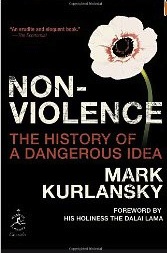 Non-Violence by Mark Kurlanksky is an excellent, opinionated history of a dangerous idea. Non-violence is not pacifism, it is active opposition to oppression. The book shows it’s both inspiring and depressing to see how the idea has been tried through-out history, but knocked back by every war. But ‘the advocates of peace and non-violence come back stronger and more numerous each time.’ As the brave people of Syria continue to resist, it’s a reminder that other countries can help non-violently with ‘investment/arms ban, isolating, and cyber-attack’ before using force.
Non-Violence by Mark Kurlanksky is an excellent, opinionated history of a dangerous idea. Non-violence is not pacifism, it is active opposition to oppression. The book shows it’s both inspiring and depressing to see how the idea has been tried through-out history, but knocked back by every war. But ‘the advocates of peace and non-violence come back stronger and more numerous each time.’ As the brave people of Syria continue to resist, it’s a reminder that other countries can help non-violently with ‘investment/arms ban, isolating, and cyber-attack’ before using force.
It is odd that we can accept the need for courage to do battle with an enemy, but not the courage to stand bare-breasted before an enemy’s guns A C Grayling review
Tags: Peace, people power, political change
Posted in Peace | No Comments »
Thursday, July 28th, 2011
 This is the beautiful Burmese name for Aung San Suu Kyi who is giving the 2011 Reith Lectures (listen here); recordings smuggled out of Burma. Her wisdom, determination and sense of humour come through in these talks. When asked how she lives with the likelihood of being shot, she says ‘that’s always a possibility, but on the other hand there’s always the possibility that you might be knocked down by a bus…’ The programme includes an audience discussion of ways to approach Burma; engagement and targeted sanctions seem to be the favoured options.
This is the beautiful Burmese name for Aung San Suu Kyi who is giving the 2011 Reith Lectures (listen here); recordings smuggled out of Burma. Her wisdom, determination and sense of humour come through in these talks. When asked how she lives with the likelihood of being shot, she says ‘that’s always a possibility, but on the other hand there’s always the possibility that you might be knocked down by a bus…’ The programme includes an audience discussion of ways to approach Burma; engagement and targeted sanctions seem to be the favoured options.
My very top priority is for people to understand that they have the power to change things themselves.Time article
Tags: non-violence, Peace, people power
Posted in Peace | No Comments »
Sunday, May 22nd, 2011
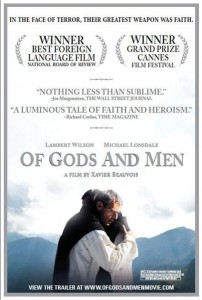 The world didn’t end yesterday as predicted, but one thing is for sure, we’ll all die one day. Of Gods and Men is a powerful movie about facing death and questioning one’s purpose. This story of monks caught in the Algerian civil war has 2 stunning scenes: the monks facing down the guns of extremists armed only with their convictions about peace; and a meal where they agree to face death together. Peter Bradshaw says this scene ‘is an overwhelming fusion of portraiture and drama, and perhaps one of the most sensational things I have seen on the big screen’ (read review). I agree, it’s a riveting moment of film-making. (I’m biased – the monks were beekeepers).
The world didn’t end yesterday as predicted, but one thing is for sure, we’ll all die one day. Of Gods and Men is a powerful movie about facing death and questioning one’s purpose. This story of monks caught in the Algerian civil war has 2 stunning scenes: the monks facing down the guns of extremists armed only with their convictions about peace; and a meal where they agree to face death together. Peter Bradshaw says this scene ‘is an overwhelming fusion of portraiture and drama, and perhaps one of the most sensational things I have seen on the big screen’ (read review). I agree, it’s a riveting moment of film-making. (I’m biased – the monks were beekeepers).
Tags: movies, non-violence, Peace
Posted in Movies, Peace | No Comments »
Saturday, April 23rd, 2011
Peace is not the product of terror or fear.
Peace is not the silence of cemeteries.
Peace is not the silent revolt of violent repression.
Peace is the generous, tranquil contribution of all to the good of all.
Peace is dynamism.
Peace is generosity.
Bishop Oscar Romero (1917–1980)
Tags: Peace
Posted in Peace | No Comments »
Saturday, April 9th, 2011
All happiness depends on a leisurely breakfast – John Gunther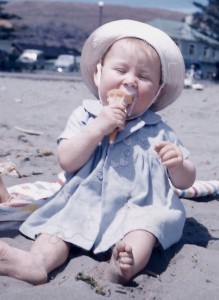
I’m on holiday.
Photo: me at Akaroa, age 2?
Tags: Peace
Posted in Peace | No Comments »
Wednesday, March 16th, 2011
Tags: Peace
Posted in Peace | No Comments »
Wednesday, February 2nd, 2011

I admire the courage of the people power movements in Egypt and Tunisia in facing their military rulers. As Tolstoy said,
‘For us to struggle (the forces being so unequal) must appear insane. They have millions of money and millions of obedient soldiers. We have only one thing, but that is the most powerful thing in the world: Truth.’
The ‘truth’ here refers to peace and non-violent protest. Non-violent action has been successful in bringing political change. It even worked briefly against Hitler when much of the population of Denmark resisted the Nazi occupiers. Danish workers organised large-scale strikes and succeeded in slowing the supply of war materials to the German army.
People power has blossomed over the past fifty years. In the 1970s the military rulers of Argentina were confronted by a group of mothers who’d lost children in the ‘dirty war’. Their protest drew the attention of the world and the government fell. And don’t forget the massive strike by Solidarity workers in 1980 leading to democracy in Poland; and tens of thousands of civilians who deposed a dictator the Philippines; the wonderfully named ‘Singing Revolution’ (1987–1990) restored independence in the Baltic States; peaceful protests in Chile in 1988 helped to remove Pinochet; and 100 000 people gathered in Wenceslas Sq to end communist rule in Czechoslovakia in 1989. There’s been social change too, such as civil rights movements in the US and South Africa.
But any confrontations between civilians and the military state are a ‘slippery zone’. So to quote our Centre for Peace and Conflict Studies, I hope that Egyptians continue to ‘express their views non-violently’; and ‘the authorities exercise restraint’.
Tags: Egypt, non-violence, Peace, people power, political change, Tolstoy
Posted in Peace | 3 Comments »
 Martin Luther King Jr.’s, Strength To Love, was written during the Civil Rights struggle in the early 1960s. King’s stirring style was aimed at a live church audience and you can almost hear the “Amens” after some sentences. Many of his political statements were censored by the publisher at the time, but almost 60 years later his words remain powerful and relevant. King encourages people to be forgiving, non-violent, non-conformists; and to confront militarism and inequality in society.
Martin Luther King Jr.’s, Strength To Love, was written during the Civil Rights struggle in the early 1960s. King’s stirring style was aimed at a live church audience and you can almost hear the “Amens” after some sentences. Many of his political statements were censored by the publisher at the time, but almost 60 years later his words remain powerful and relevant. King encourages people to be forgiving, non-violent, non-conformists; and to confront militarism and inequality in society.













